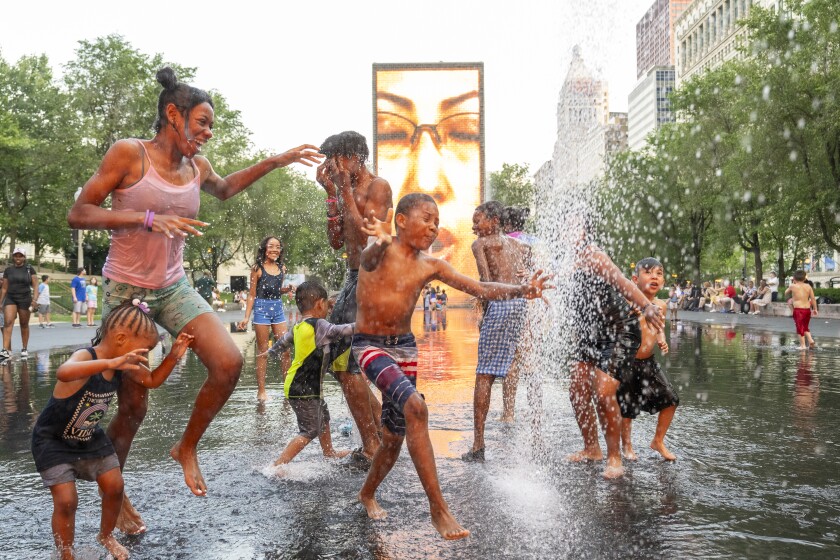With temperatures soaring into the 90s over the next week, Chicago-area residents are being advised to be on the lookout for the warning signs of heat exhaustion, heat stroke and other hot weather-related illnesses that can lead to serious problems.
“Heat illnesses can occur when the body is dehydrated and not able to properly cool itself by sweating,” Dr. Kush Desai of the Rush University Medical Group said in a written statement. “In some cases, your body’s temperature rises faster than it can cool itself down, which has the potential to cause damage to vital organs.”
Heat rash, heat syncope, heat cramps and rhabdomyolysis are other common weather-related illnesses that are characterized by their own symptoms and severity.
But heat stroke is the most serious of the illnesses sparked by hot weather, according to the U.S. Centers of Disease Control and Prevention, with body temperatures rising to 106 degrees or higher within 10 to 15 minutes.
According to the CDC, both heat stroke and heat exhaustion are characterized by high body temperatures, headaches, dizziness, nausea, a fast ,weak pulse and loss of consciousness.
“Heat stroke is the worst and the most dangerous one,” said Dr. Oyinkansola Okubanjo, an emergency medicine physician at Advocate Christ Medical Center in Oak Lawn. “People need to go to the ER if there’s a concern that they’re suffering from heat stroke.”
While waiting for paramedics to arrive, it’s important to move the person to a cool environment, pouring cool water and fanning the person, and cooling down hot zones such as the hands, feet and neck with ice packs, Okubanjo said.
Heat exhaustion occurs when the body overheats, but it isn’t as severe as heat stroke. Symptoms of heat exhaustion include muscle cramps, clammy skin and feeling thirsty. Without prompt treatment, heat exhaustion can lead to heat stroke.
“For these people, you don’t necessarily have to call 911 immediately, but you should definitely get them to a cool place and [give them] plenty of fluids to drink to combat the heat exhaustion,” Okubanjo said.
Generally, to stay safe during hot weather, the Chicago Office of Emergency Management and Communications encourages and recommends:
- Staying hydrated
- Staying inside with air conditioning on
- Keeping shades and blinds closed if you do not have air conditioning
- Keeping electric lights off and turned down
- Limiting the use of ovens or stoves
- Wearing loose or light clothing
- Taking cool baths and showers
- Not leaving people or pets in parked cars
Spending time in local cooling centers run by the Salvation Army or the city’s Department of Family & Support Services can also help prevent heat-related illnesses.
The Salvation Army Corps plans to operate its 17 cooling centers daily until the heat wave subsides. More locations will soon be open, and all available cooling center locations can be found through the organization’s website at SalArmyChicago.org.
The city’s Department of Family Support Services operates six cooling centers, but only one —- the Garfield Community Service Center at 10 S. Kedzie Ave. — will be open on Wednesday. The other five will be closed for the Juneteenth holiday. Typically, the sites are open 9 a.m. to 5 p.m. Monday through Friday during heat waves. Locations and other information can be found at www.chicago.gov.
Staying hydrated and finding other ways to stay cool is especially important when spending time outdoors — whether for leisure or work.
Taylor Brown, 16, of Woodlawn, reported for her noon shift Tuesday at Shoreline Sightseeing at Navy Pier.
The clouds and breezes from Lake Michigan helped her and her coworkers cool off, but there was no escaping the heat at the height of the afternoon.
“It’s been pretty hot outside,” Taylor said. “It’s been breezy, and [the wind] has been cooling me off a little bit, but it’s still been hot.”
Ice cream bars and a full water bottle were part of co-worker CJ Strahan’s strategy to stay cool.
Echoing the sentiments from experts to stay hydrated, the 22-year-old Auburn Gresham resident has another tip for avoiding heat-related illnesses.
“Make sure you tell your managers you need a break because it can get hot out here,” Strahan said.







